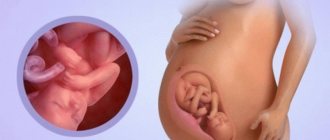Gestosis: symptoms of late toxicosis
In the first weeks of pregnancy, a woman experiences so-called “pure toxicosis”. This is due to hormonal changes, fetal implantation and changes in body systems. But sometimes similar symptoms occur in the second and even third trimester of pregnancy.
This is a serious pathology - late toxicosis. Requires immediate treatment and constant medical supervision. Most often appears after the 35th gestational week. In some cases, symptoms persist for some time after delivery.
Signs of late toxicosis:
- increased swelling;
- lack of appetite;
- bowel dysfunction;
- loss in body weight;
- protein in urine;
- vomiting, nausea;
- increased blood pressure;
- apathy and deterioration of health.
The clinical picture is quite clear: the woman does not observe dangerous symptoms for a long time, but gradually feels tired, swelling appears, and tests show the presence of protein in the urine.
Gradually, migraines, insomnia, convulsions, vomiting and increased blood pressure are added to this list. After this, the pathology develops rapidly and therefore immediate therapeutic measures are required.
Why does vomiting bother you?
Experts do not yet know all the subtleties of the processes that accompany the birth and gestation of a new life in the mother’s womb, however, they were able to establish which factors most influence the development of vomiting during pregnancy in the second trimester.
- Imbalance of nutrients and vitamin substances. After fertilization, the body begins to provide nutrition and vitamins for two people. The fetus grows, its needs increase along with it, and it is difficult for the body to provide a complete set of nutrients even with a relatively balanced diet.
- Hormonal changes. The highest levels of estrogen hormone are observed in pregnant women until the end of the first trimester, but often the concentration of this substance remains at 4 months. Such progesterone instability leads to a slowdown in the functioning of the gastrointestinal tract structures, which leads to various disorders such as vomiting, nausea, etc.
- Sometimes after eating the patient experiences malaise and heaviness, so as not to experience them anymore, the pregnant woman refuses to eat. With a strong feeling of hunger, patients may feel severe nausea, dizziness and weakness, sometimes mothers even vomit against the background of hungry sensations.
- Impaired functionality of the gastrointestinal tract, which is often observed in multiple pregnancies. Increased pressure is created on the walls, more space is required for the uterus, which compresses neighboring organs. Such reasons cause disturbances in the functionality of intestinal and gastric structures. Due to compression, food can be thrown back into the stomach or esophagus, which causes nausea, heartburn, and sometimes vomiting.
- Hypertension – patients often vomit when their blood pressure is high.
- Infectious lesions, in which patients are worried about fever and hyperthermia, nausea and vomiting reactions. Further evidence that the causes of lightheadedness are associated with infection is the presence of diarrhea.
- Hypotension usually occurs in girls who suffer from VSD even before pregnancy. Under the influence of pregnancy, the condition worsens and the pressure drops even lower, which leads to nausea, vomiting, etc.
It is quite difficult to independently identify the cause of vomiting, so medical assistance is necessary.
Causes
Unfortunately, it is impossible to completely prevent the development of gestosis. Doctors still cannot identify any underlying cause. This is influenced by a combination of individual factors: chronic diseases, heredity, characteristics of the course of pregnancy.
There is a risk group of women who have a greater chance of developing pathology:
- early age of the expectant mother up to 18 years old or, conversely, late – 30;
- pregnancy using IVF;
- conception through incest;
- chronic diseases (diabetes, asthma and others);
- bearing several fruits;
- have had infectious diseases during pregnancy;
- associated complications during gestation.
Patients included in this group should carefully monitor their well-being and undergo tests in a timely manner in order to identify the pathology at the beginning and take corrective measures.
Gynecologists strongly recommend these same tips be followed by other women, even if they are not at risk. Now most doctors agree that the main reason for the development of complications is a disruption of the internal functioning of blood vessels, which provokes microthrombosis in the organs and placenta.
How to treat
When vomiting occurs in the middle of pregnancy, women sometimes do not know how to alleviate their condition and how to help themselves. If vomiting starts on an empty stomach, then mommy is advised to eat something, only the food should be light. When going to bed, prepare yourself an apple and a glass of water, some crackers in advance, so that when the morning urge appears, you can immediately prevent a vomiting reaction.
In general, treatment and control of nausea and vomiting conditions in the second trimester of gestation may involve drug intervention, dietary therapy and home relief methods.
Medicines
Doctors usually resort to medicinal treatment of vomiting reactions in pregnant women with vomiting of 2-3 degrees of severity, when the woman noticeably loses weight and suffers from vomiting 10 or more times a day. If vomiting in the second trimester is caused by prolonged toxicosis, then the doctor may prescribe antihistamines and antiemetic tablets; to improve liver function, hepatoprotectors are indicated, and in case of intoxication, enterosorbent agents are recommended.
Among the anti-nausea tablets that are relatively safe for mothers are: Hofitol, Cerucal, etc. Among enterosorbents, it is better to choose Polysorb, activated carbon, and among hepatoprotectors, Essentiale Forte N. Detoxification medications, physiotherapeutic procedures, vitamin complexes, etc. also alleviate the condition.
Diet therapy
Some adjustments in the diet will help mommy cope with vomiting at home. It is necessary to properly organize the pregnant woman’s nutrition, eliminate stressful situations and worries, and create the most favorable and comfortable environment around the woman.
- If vomiting reactions occur after meals, then it is necessary to avoid eating salty, spicy or fatty foods, dishes that have an unpleasant odor that causes nausea.
- In such a situation, flour dishes, as well as those containing a lot of sugar, are also unhelpful.
- Mommy needs to eat 5-6 times a day in small portions; the digestive system should not be overloaded with large portions.
- It is unacceptable to skip meals and leave yourself hungry; such behavior can only complicate the condition.
- When preparing food, the apartment must be ventilated, cooked with the hood on, the window open, etc.
- Immediately after eating, mommy is not recommended to lie down, and clothes should be loose and not tight on the stomach.
- Try to spend more time outside the city, in the fresh forest air, take a walk, preferably every evening.
In general, a pregnant woman’s diet should be varied and nutritious. The basis should be vegetables and lean meat, fruits. If, after adjusting the diet, vomiting does not go away, then specialist intervention is needed.
Home Remedies
It is necessary to include fresh fruits in the menu.
Traditional medicine also offers a lot of remedies for the treatment of vomiting during pregnancy. Medicinal decoctions, such as mint, have an excellent effect. You can also prepare a decoction from a herbal mixture that includes yarrow, marigold and mint. 2 dessert spoons of each plant should be steamed with boiling water and left for at least half an hour. Then the mixture is filtered and taken several times a day, drinking in small portions.
Cranberry fruit drinks are very helpful in the fight against vomiting and dehydration. When you feel unbearable nausea creeping up your throat, you need to drink a small amount of this fruit drink in small sips; many pregnant women note that this remedy quickly relieves an attack of malaise, alleviating the condition.
Protein-containing foods such as cheese, eggs or fermented milk products will help avoid vomiting in the morning, and fruits will also help. Evening ailments are more often associated with overwork, so mommy needs to give herself time to rest, taking short breaks.
The danger of gestosis when carrying a child
Preeclampsia is considered one of the serious complications of pregnancy, but it all depends on the stage. Naturally, at the onset of pathology, it is possible to stop the symptoms and normalize the condition, safely carrying the child to term. But, at an advanced stage, late toxicosis can be fatal for mother and baby.
Swelling spreads to the woman’s internal organs and can even affect the brain. It negatively affects the placenta, causes hypoxia and, in severe cases, the death of the child. In the event of such a threat, the woman in labor undergoes an emergency caesarean section.
Stages of pathology
Preeclampsia is classified as follows:
- Dropsy
- swelling in the arms and legs. But this is not only a sign of this pathology, so it is necessary to undergo tests to confirm. - Nephropathy
- high blood pressure is added to swelling. Already at this stage there is a danger to the woman’s life and she needs to urgently consult a doctor. The complication can quickly develop into another lethal form. - Preeclampsia
- the blood flow of the central nervous system is disrupted, at the same time nausea, high blood pressure, insomnia, migraine, protein in urine are observed. It is quite possible that there is a mental disorder due to pathology. - Eclampsia
requires urgent medical intervention. Convulsions are added to the previous symptoms, stroke, coma and death are possible. The placenta rapidly ages, and the baby may die.
Any form of gestosis poses a danger to the baby: it provokes hypoxia, lack of nutrition, and disrupts blood flow.
Unfortunately, gestosis begins unnoticed, but develops rapidly and moves from one stage to another, so doctors prescribe additional tests at the first sign.
Treatment
If you suspect gestosis and the first symptoms appear, you should contact a gynecologist as soon as possible. Initially, the complication can be treated at home. But, of course, it is better to go to a hospital in order to be under constant control and if the condition worsens, doctors will be able to provide assistance in a timely manner.
The doctor will prescribe tests and examination to identify the provoking factor. After the conclusion, the correct treatment will be prescribed. In severe cases, the woman in labor will be urgently hospitalized and may even undergo a caesarean section.
With this diagnosis, a woman must follow a certain diet:
- spicy, smoked and pickled foods are not allowed;
- you can drink no more than a liter of liquid per day;
- food rich in proteins and vitamins.
Medications prescribed include sedatives and tablets to normalize blood pressure, most often Dopegit.
Prevention
For prevention, you need to follow basic recommendations, but unfortunately, even this will not guarantee that preeclampsia will not occur. Therefore, timely observation by a gynecologist is one of the keys to a successful pregnancy.
Recommendations:
- absence of stress and neuroses;
- quality sleep, rest;
- proper nutrition;
- acceptable physical activity;
- walks in the open air;
- weight gain control;
- strengthening the immune system.
Being in an interesting position, a woman should carefully monitor her well-being. Preeclampsia can lead to tragic consequences, so at the first signs you need to consult a doctor for help.
Additional symptoms
In the middle of pregnancy, nausea and vomiting usually occur only in exceptional cases, and there should be no regularity in such manifestations.
- The weeks of the second trimester are more characterized by stable good health, appetite improves, toxicosis recedes, weight returns to normal and is gradually gained.
- Moms' sleep is normalized, an incredible surge of energy is felt, the uterus does not yet take up much space in the abdominal cavity, and therefore there is no discomfort characteristic of late pregnancy.
- If manifestations of nausea and vomiting reactions appear, this indicates the presence in the body of a large amount of toxic substances in the body’s structures, an increase in acetone in the bloodstream, etc.
- Additional symptomatic manifestations of such conditions are sleep disturbances, depression, drowsiness and excessive fatigue.
To treat severe cases of vomiting, women are prescribed infusion therapy or tablets.








